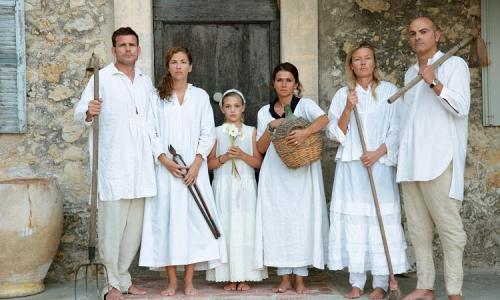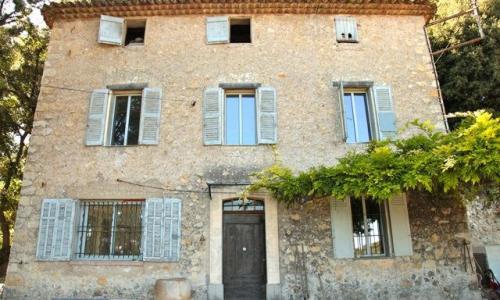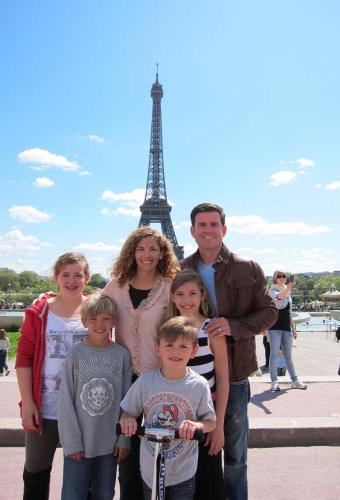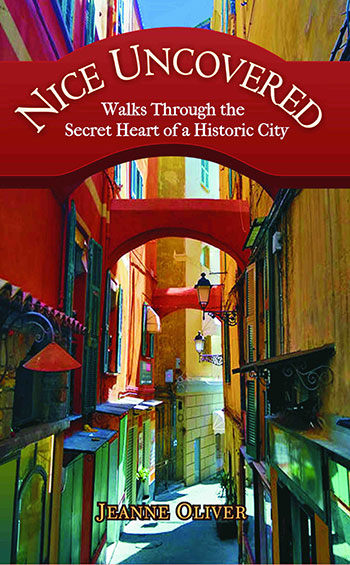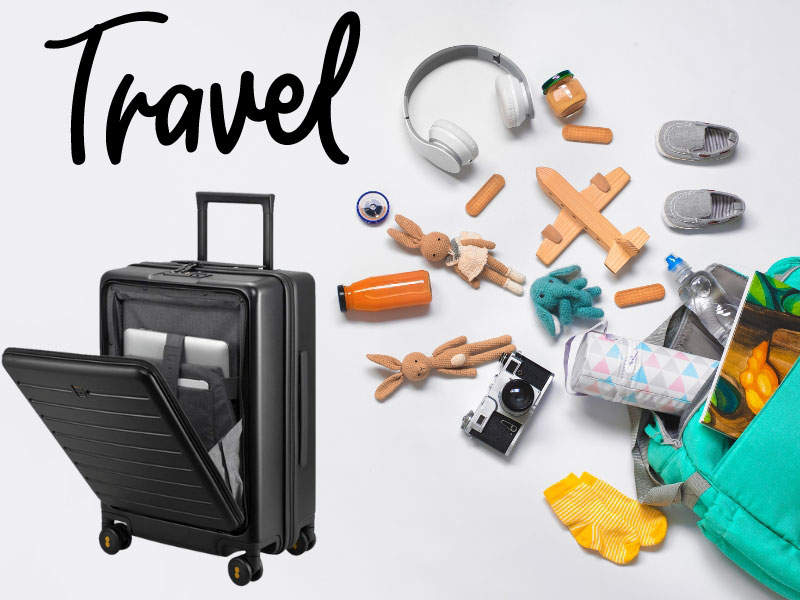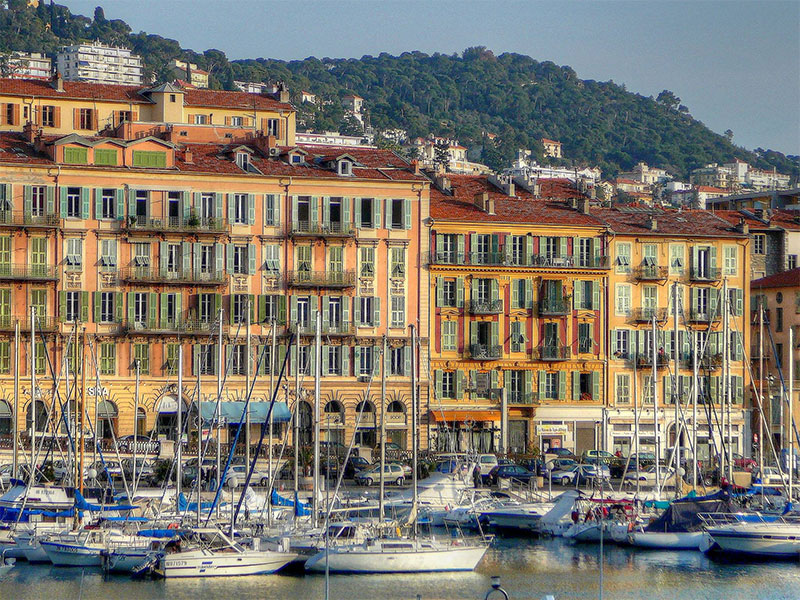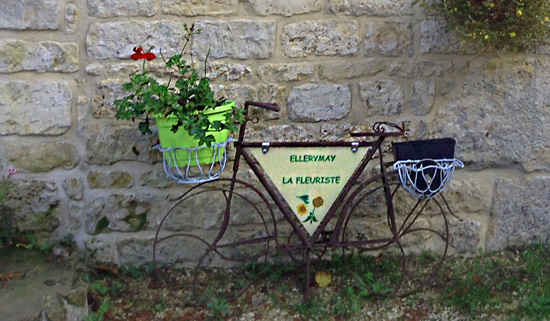We talk to Dave Ashton of SnapCar Paris who is from Phoenix, Arizona. Dave, his wife Stasha and their four children came to France in 2007 on a one year home exchange with a family from Provence. At the end of the year they had fallen in love with France and wanted to stay longer.
Five years later Dave has set up his own company in Paris: SnapCar, a mobile app that ensures you’ll find a high quality taxi or chauffeured vehicle whenever you want one. He spends his working week in Paris and free time back home with the family in Mougins where they are renovating their house.
The family home is a 19th century stone farmhouse in a quiet village in the hills of the Cote d’Azur, near Cannes. Dave laughs when he tells how the family house in Phoenix was 4200 square feet with 5 bedrooms and 4 bathrooms, a massive kitchen, a pool and jacuzzi in a huge yard with fruit trees, and a three car garage in a house where everything was new and just worked. In contrast, the house in Mougins is 1300 square feet with three bedrooms and one full bathroom (for six people), a leaking roof, dirty stone walls, a hideous kitchen, tiny bedrooms, power that works most of the time, no garage and a yard that “needs a lot of help”. The renovation work on the Mougins house is laborious and slow and Dave may not be kidding when he says that if anything makes he and Stasha just give up and leave it will probably be that house.
We asked him more about what made him stay…
TGLF: Can you tell us more about who you are and where you are from?
I moved around a lot as a child, and so perhaps discovering new places got in my blood from those experiences. As a family, we moved every few years when I was growing up: Illinois, Ohio, Missouri (where I became a lifelong St Louis Cardinals’ baseball fan), Arizona, Maryland, Minnesota, Utah (where I met Stasha) and ultimately California (San Francisco), where I started my first job after college and then went to graduate school. I also spent two years living in Hong Kong in the early 1990’s, an experience that deeply impacted my perspective on the world and my place in it.
TGLF: What made you decide to go to France for a year and why a home exchange scheme?
It was perhaps one of those things where luck, timing and perseverance all came together at the same time. In 2003 I was working for a software company based in Phoenix that sent us to live in London for a year. We had an amazing experience and were very sad to leave at the end of the year. It’s not that we didn’t want to go back to the US – in many ways we did: we’ll always be full-blooded Americans (!) – but we loved England immediately and one year just wasn’t long enough. In the several years that followed, Stasha and I said to ourselves many times that we would move back to Europe at the drop of a hat if given the chance, and that the only thing that could perhaps be better than England was a place just like it but with better weather, food, more Medieval culture and a different language. Apologies to our English friends, but for us that was France (although not necessarily Paris, which has dreadful weather). Early in 2007 the company I’d been working for was sold and I decided to take some time off. At the same time we received a request from a family in Mougins asking if we were interested to exchange houses for a year (I had joined the site www.homeexchange.com a few months before – the site really works!). The timing was so serendipitous that we couldn’t resist. I think we knew that – with four children, if we said “No” then we would be unlikely to ever get the chance again – life becomes pretty complicated as the kids gets older. So, as frightened as we were to leave everything we loved and go to a place where we knew no one and couldn’t speak a word, we decided to throw caution to the wind, said “Yes!” and off we went.
TGLF: What made you stay in France after the year was up?
A life is only as interesting as we make it. That first year was the most amazing, scary, life-changing, frightening experience we could have had. And it becomes addictive – after a certain amount of time it became hard to imagine going back to the old life in Phoenix. It’s odd because we really loved that old life and longed for it throughout our first year (and still often do!). Where we could understand people, had our own house and cars, stores were open all the time, we weren’t afraid to answer the phone for fear of not being able to understand people, we were near family and old friends and familiar surroundings and where it’s easy to watch the St Louis Cardinals. But the joy of learning something new every day, the challenge of overcoming one obstacle after another on the way to conquering a new culture and language, watching our kids become so fluent in the language that others didn’t know they weren’t French: we just felt like we couldn’t give it up after only one year. So we talked it over, Stasha cried a lot (we knew we were going to really miss the US), we registered the kids for another school year in Mougins and starting looking for rentals, put our house in Phoenix up for rent and that was that.
TGLF: Your kids weren’t too keen to move here at first – but how do they find it now?
They were afraid of the change, and when we first got here they were really unhappy because we took the “immersion” approach despite them not even knowing what France was – much less speaking the language – we just took them to the village school our first day in Mougins and said “This is where you go to school now. You’re not going to understand anything for a while but if you’re patient and – most of all – kind to others, you’ll eventually start to understand and it will get easier.” And it did. Their progress was incredible to watch. I’ll probably go to my grave with a smile on my face remembering the story of how they learned, and how it transformed them – and all of us. Put in the same situation, any child would do the same thing, which was to learn and then embrace.
TGLF: Is the move to France permanent now?
Nothing in life is permanent. Like every couple, we still lay awake in bed at night wondering if we made the right choice and talking about “when we go back to the US”. The kids still beg us to move back to the US probably because now they equate the US with vacations and France with daily life). But the time frame for that seems elongated now. Rather than discussing if we’ll go back at the end of this school year, we talk about it in terms of life events: maybe our oldest daughter will finish high school in the US; maybe we’ll move back after we’ve completely renovated our house and then lived in it for a couple of years; or maybe we’ll go back once SnapCar has become a huge success (or a massive failure!). [Ed’s note – surely a success – everyone knows how difficult it is to get a taxi in Paris, especially when it rains!] All of these things are probably years away. There is a song that’s been popular this year in both the US and France : “Somebody I Used to Know” by Gotye, in which he laments that, as time passes, a girl he once loved has now become a stranger to him and is no longer anyone important anymore. We may not spend the rest of our lives here, but France has become such an important part of our lives that it’s hard to ever imagine it just becoming “some place I used to know.” Just like Thanksgiving, Target, and the St Louis Cardinals are an important part of who we are, France’s language, customs, and culture are in our blood too, now. I just wish it had the NFL…
TGLF: What gave you the inspiration for SnapCar?
After our home exchange year, when we decided to stay in France, I got a job with KDS, a software company in Paris (600 miles away), because that was the best place in the software industry to work in France. KDS owns a successful software application that enables people to book and manage their business travel costs in a carefully-controlled way. While working there I realized that there was a big hole in the market for better managing taxi/ground transportation services. This epiphany came from two things:
Airline tickets, hotels and car rentals are bookable online and all carefully managed, but taxi bookings were a big problem: totally unmanaged by software and a nightmare for users to manage themselves. It’s incredible that the old method of standing on a street corner in an unfamiliar city, hoping an empty taxi will pass by, is still the prevailing method of getting a taxi. It hasn’t really changed since the invention of the “modern taxi” more than a hundred years ago. Every other method of travel has been transformed in the last twenty years, so the fact that ground transport remains stuck in the Stone Age is really odd.
Because Paris is 600 miles from Mougins I would fly to my office every week and spend the work week there going home at weekends. My options getting taxis at the airport were pretty bad: either stand in long lines, get refused service by the drivers, get in a car that was falling apart, always have to pay in cash and perhaps lose the receipt (creating expense report problems), or I could order a limousine to pick me up, which cost up to five times as much as a taxi. So I just had to deal with the possibility of bad taxi experiences: every… single…week.
Ugh. It’s not that this happened every time – it didn’t – but it occurred often enough that I was always afraid of the possibility. And it’s the anxiety of not knowing that creates negative experiences for people. It’s not that taxi experiences are so bad – they’re not necessarily so at all – but the problem is that you can’t know. When you take a plane ride, you know what you’re going to get. When you book a Hilton hotel, you know what you’re going to get. When you go to McDonald’s, you know what you’re going to get. But taxis are often like life – and a box of chocolates – you never know what you’re going to get. And with travel that is a bad thing.
I finally just thought “I can’t be the only person who has these experiences, and it just can’t stay this way. If KDS manages other business travel so well, and Home Exchange can transform home exchanging using software, then surely we can change how the world accesses ground transportation, no?” So I started SnapCar. And now we’re doing it.
TGLF: How was it setting up a business in France? Were there many hurdles to overcome?
Like with most things in life, it’s better if you experience it with a great partner. In 2011 I started working on the project alone. I generally knew what I wanted to build and just set about doing it. But owning/managing all development, all distribution, technical infrastructure and all administrative aspects of a business that you want to grow quickly is just too much for one person, especially a foreigner in France. The administrative and technical infrastructure aspects of a business don’t ever make you any money, and they were a mystery to me anyway, so I just ignored those things when setting up my company. Instead I focused on just building a product and finding people to use it. The right priority, right?
But deep down I knew that you can’t function effectively in France (or anywhere) without addressing the administrative and technical infrastructure sides of your business, and that if I kept ignoring those things it would become a real problem. But in a stroke of luck, I ultimately found a partner who is not only great at the administrative elements of French business (I’m not saying he loves those things, just that he’s good at them!), but is also a co-founder in every operational sense of the word. He’s an incredibly successful French entrepreneur who sees the need for this technology the same way I do, and was anxious to solve the same problem. So in early 2012 we founded SnapCar together. We move faster, make better decisions (two heads are five times better than one), aren’t hindered by the endless administrative hurdles, and were able to set up the kind of technical infrastructure that has created a nimble but significantly scalable start-up. It’s exactly what I envisioned when I first had the idea way back in late 2009. We still have a long way to go but we’re on our way.
TGLF: Would you say that France is a good place for non-French entrepreneurs such as yourself?
I think that depends more on where you’re focused and what customers you’re serving, as well as how you feel about France. If you want to start a B&B, a tour business or if you’re a trained lawyer offering advice to ex-pats here in France. I think it can be very doable. But software has high start up costs and is administratively complex. So if you’re building software and don’t speak the language or appreciate the culture then you have two strikes against you already. But even if you do speak and understand and love the country, it can still be hard. It’s hard everywhere – competitors don’t just lay down and let you walk all over them.
What we’re doing at SnapCar is very unique and people really love it. But I wouldn’t have got this far without the right co-founder and team. As with most things in life, success is in large part a function of those you surround yourself with. So no matter what business you want to start, begin with a love of all the things that are great about France, including its language and culture, and then surround yourself with good people. Everything else will follow from there. It will most likely be hard, but that is because you’re starting a business, not necessarily because you’re in France. Then go out and enjoy the ride!
